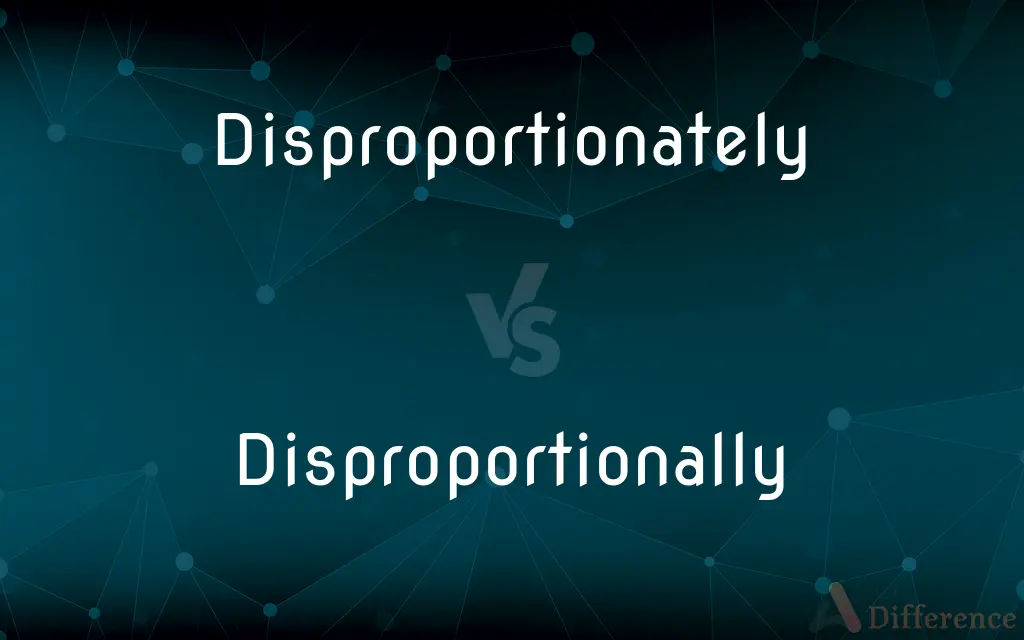Disproportionately vs. Disproportionally — What's the Difference?
By Fiza Rafique & Urooj Arif — Updated on March 27, 2024
Disproportionately focuses on the extent of imbalance, typically used in quantitative contexts, while disproportionally often describes the manner or quality of being uneven or out of proportion.

Difference Between Disproportionately and Disproportionally
Table of Contents
ADVERTISEMENT
Key Differences
Disproportionately is frequently employed in discussions where there's an emphasis on the degree to which something is uneven or lacks balance, particularly in statistical or measurable outcomes. For example, a small group might be disproportionately affected by a policy change. Whereas disproportionally is used more broadly to convey the concept of imbalance or lack of proportion, without the strong implication of measurement or quantification.
Disproportionately can suggest a significant deviation from what is considered normal or expected, especially in contexts where numbers or percentages are involved. This term is useful in highlighting scenarios where there's a notable disparity. On the other hand, disproportionally might be chosen to describe situations where the focus is less on the exact scale of imbalance and more on the existence or effect of such an imbalance.
In analytical writing or reports, disproportionately is a key term when quantifying disparities, such as in socioeconomic research where specific outcomes are measured and analyzed. It allows for a precise articulation of imbalances. Disproportionally, while still applicable in analytical contexts, might be seen more often in qualitative descriptions, emphasizing the nature of an imbalance rather than its specific dimensions.
When discussing issues of social justice or representation, disproportionately is often used to highlight the specific and measurable ways in which certain groups may be over- or underrepresented. This usage underscores the importance of data in understanding societal imbalances. Disproportionally, in these discussions, can serve to broaden the conversation to include qualitative assessments of inequality, where precise measurements might not be the focus.
In everyday language, disproportionately might be preferred when the speaker wishes to stress the significant or unexpected nature of a disparity. This choice helps to underline the impact of the disproportion. Disproportionally, meanwhile, provides a more general way to discuss imbalances, suitable for when the details of the disproportion are not the main concern.
ADVERTISEMENT
Comparison Chart
Primary Usage
Emphasizing the degree of imbalance
Describing the manner of being uneven
Contexts
Quantitative analysis, statistical reporting
Qualitative descriptions, general imbalance
Implication of Measurement
Strong implication of quantification
Less focus on quantification
Common Fields of Use
Economics, social sciences, health
Literature, everyday language
Example Sentence
"A small population was disproportionately affected by the law."
"The burden was disproportionally distributed among the team."
Compare with Definitions
Disproportionately
Significantly more or less than is fair or reasonable.
The punishment was disproportionately severe for the crime.
Disproportionally
In a manner that is not proportionate.
Benefits were disproportionally allocated among employees.
Disproportionately
Affecting parts of a group or system in unequal ways.
Funding cuts have disproportionately impacted rural areas.
Disproportionally
Unevenly or unfairly distributed or balanced.
Resources are disproportionally scarce in impoverished neighborhoods.
Disproportionately
In a manner that does not correspond in size or intensity with something else.
The response to the minor infraction was disproportionately large.
Disproportionally
Out of alignment with expected or usual proportions.
His reaction was disproportionally intense compared to the situation.
Disproportionately
To an extent that is too large or too small in comparison with something else.
The small town is disproportionately represented in the national statistics.
Disproportionally
Not corresponding in size, extent, or degree.
The workloads were disproportionally divided among the team members.
Disproportionately
In a way that is out of proportion with the norm or expectation.
Wealth is disproportionately concentrated in the top 1% of the population.
Disproportionally
Affecting different parts of a system or group in varied ways.
The new policy disproportionally affects younger workers.
Disproportionately
Out of proportion, as in size, shape, or amount.
Disproportionally
Disproportionate.
Disproportionately
In a disproportionate manner
Disproportionally
In a disproportional manner, or to a disproportional extent; disproportionately
Disproportionately
To a disproportionate degree;
This wall is disproportionately long
Disproportionally
In a disproportional manner; unsuitably in form, quantity, or value; unequally.
Disproportionately
To a disproportionate degree;
His benefits were disproportionately generous
Common Curiosities
Is disproportionally a real word?
Yes, disproportionally is a real word used to describe actions or effects that are not in proportion.
How do you use disproportionately in a sentence?
"The new policy disproportionately benefits the wealthy, leaving lower-income families behind."
What is the difference in usage between disproportionately and disproportionally?
Disproportionately is often used when there is a quantifiable measure of imbalance, whereas disproportionally is used more generally to describe any kind of imbalance, without necessarily quantifying it.
What does it mean to be disproportionately affected?
It means to be affected to a greater or lesser degree than others, often in a way that is unfair or out of balance with the norm.
What does it indicate if a group is disproportionately represented?
It indicates that the group's representation is either significantly higher or lower than what would be expected based on its proportion in the broader population.
Why might a writer choose disproportionately over disproportionally?
A writer might choose disproportionately to emphasize the quantitative aspect of an imbalance or disparity.
Can something be disproportionally fair?
The term disproportionally typically implies an imbalance, so it would be uncommon to use it to describe fairness.
Does disproportionately always imply a negative outcome?
Not always, but it is frequently used in contexts where the imbalance is viewed as unfair or harmful.
Can a situation be both disproportionately and disproportionally affected?
Yes, a situation can be described as both, depending on whether the emphasis is on the measurable degree of impact (disproportionately) or the general manner of imbalance (disproportionally).
Can disproportionally be used in formal writing?
Yes, but it is more commonly found in contexts where the focus is on the qualitative nature of an imbalance rather than precise measurements.
Is disproportionally negative?
The term itself is neutral, but it is often used in contexts highlighting negative imbalances or inequalities.
How can businesses avoid disproportionate impacts of their policies?
Through careful analysis and consideration of how policies will affect different groups, seeking to minimize unfair or harmful imbalances.
How can understanding disproportionality help in social sciences?
It aids in identifying and addressing inequalities within societal structures by highlighting where and how imbalances occur.
What role does data play in discussions about disproportionality?
Data is crucial for identifying and quantifying imbalances, providing a foundation for analysis and policy-making.
Can disproportionally and disproportionately be used interchangeably?
While they can sometimes be used interchangeably, their nuances mean they are often chosen for specific contexts to convey different aspects of imbalance.
Share Your Discovery

Previous Comparison
Flute vs. Lute
Next Comparison
Electroplating vs. GalvanisationAuthor Spotlight
Written by
Fiza RafiqueFiza Rafique is a skilled content writer at AskDifference.com, where she meticulously refines and enhances written pieces. Drawing from her vast editorial expertise, Fiza ensures clarity, accuracy, and precision in every article. Passionate about language, she continually seeks to elevate the quality of content for readers worldwide.
Co-written by
Urooj ArifUrooj is a skilled content writer at Ask Difference, known for her exceptional ability to simplify complex topics into engaging and informative content. With a passion for research and a flair for clear, concise writing, she consistently delivers articles that resonate with our diverse audience.














































